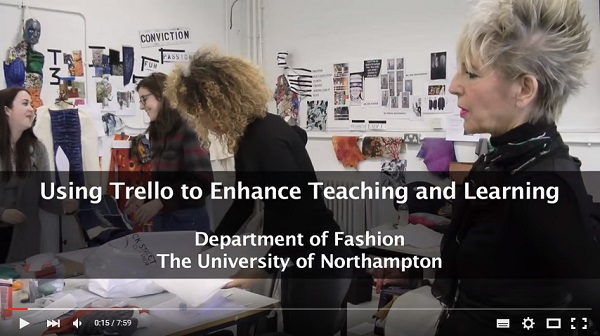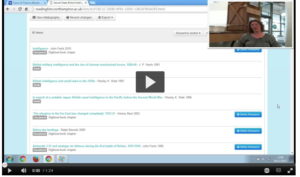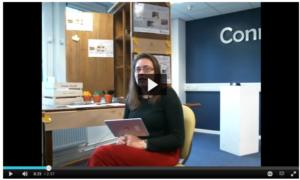Stage 3 of the CAIeRO process usually begins at the start of the second day. By this stage you should have your blueprint and storyboard finalised, and a clear vision of your new module design(s). The next step is to start making your ideas more concrete, by creating the learning and teaching activities that will support students to reach the learning outcomes.
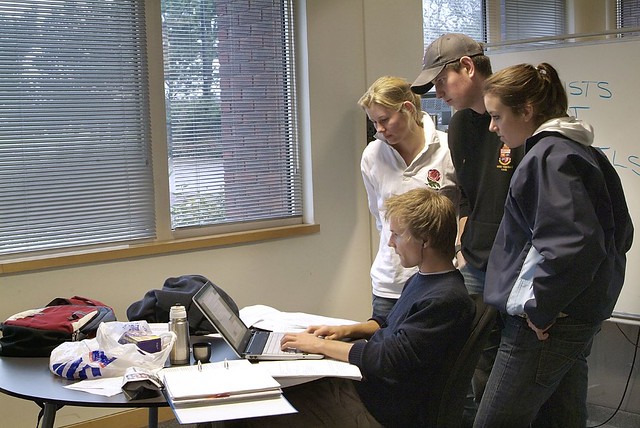 On your storyboard, you will have a number of placeholders along the learning journey where students need to learn particular things. Pick one of these to start with, and think about what kind of learning activities might help the students to get to grips with it. Is it a new concept or skill, where they will need some initial information or a demonstration from you (or someone else) to get started? Is it a complex idea or skill they will need some time to explore? Is there an opportunity to let them apply it, through experimentation or practice? Is it an area where they might benefit from sharing knowledge or experience, or being exposed to different perspectives through debate? You might find the Hybrid Learning Model cards helpful here, as they list verbs describing what the tutor and the student can do to support different types of learning.
On your storyboard, you will have a number of placeholders along the learning journey where students need to learn particular things. Pick one of these to start with, and think about what kind of learning activities might help the students to get to grips with it. Is it a new concept or skill, where they will need some initial information or a demonstration from you (or someone else) to get started? Is it a complex idea or skill they will need some time to explore? Is there an opportunity to let them apply it, through experimentation or practice? Is it an area where they might benefit from sharing knowledge or experience, or being exposed to different perspectives through debate? You might find the Hybrid Learning Model cards helpful here, as they list verbs describing what the tutor and the student can do to support different types of learning.
Creating learning activities
This section of the workshop is sometimes thought of as the ‘e-tivity bit’, but it’s important not to think too much about the technology to start with. Think about the type of activity you think would work best. If you or your colleagues have taught that subject before, what worked well? Once you know what you’d like the students to be doing, then think about the context – is this something that needs to happen in the classroom or outside? Technology can add possibilities and allow us to design learning experiences that weren’t possible in the past – think about linking up live with an expert in the field, or providing your students with world-class open educational resources. It’s also important to make sure that your students are exposed to digital learning practices, and develop the skills they will need to keep learning beyond their degree. But online is not always the best mode for every activity, so if you have face to face time with your students, make sure you use it wisely!
To help you figure out the best context for each activity, it’s important to be aware of the strengths and weaknesses of the tools available to you. Your Learning Technologist can help you with this, and you may also be able to get advice from your colleagues on their experiences. Don’t be afraid to talk about things that haven’t worked well – it may be that there are new tools or skills that could help you tweak that activity so that it works better next time, and part of the aim of the CAIeRO is to develop your skills as well as your module!
This is why we will ask you to create at least one online learning activity in the learning environment (NILE) as part of the workshop. You can take advantage of all the skills in the room, and you’ll leave with something real that you can use in your teaching! If you wish, you can use the e-tivity template, which embeds some key principles for online learning activities, including having a clear purpose, active learning tasks and opportunities for reflection and feedback. Or if you prefer, you can design your own.The reality check
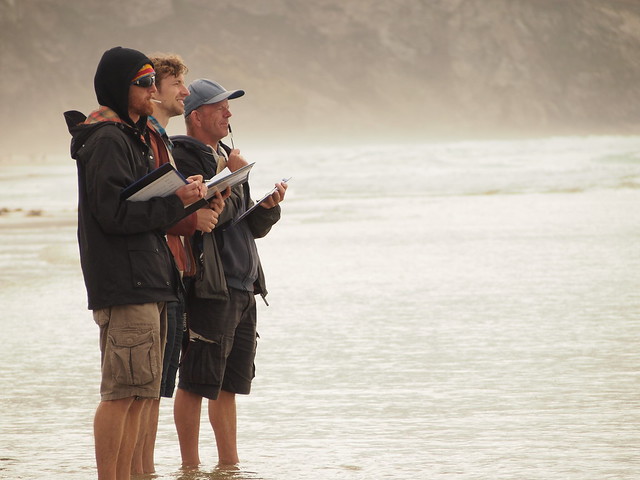 Once you have some learning activities created in NILE, it’s time to take a break while your reality checkers look them over. Reality checkers will ideally be students, but can also be colleagues, externals, anyone who has not been involved in the design of the module so far. Remember too that they don’t have to be in the room, they just need to be able to access the learning environment! The purpose of this stage of the workshop is to get an objective view of what you have created, and to provide constructive feedback to help you improve it. It’s important that you resist the urge to ‘help’ or ‘explain’ things to your reality checkers – remember when your real students come to this activity, they may not be able to call you and ask for clarification! Ideally your activity should stand by itself, with clear instructions allowing anyone who hasn’t seen it before to understand the purpose and how to complete it.
Once you have some learning activities created in NILE, it’s time to take a break while your reality checkers look them over. Reality checkers will ideally be students, but can also be colleagues, externals, anyone who has not been involved in the design of the module so far. Remember too that they don’t have to be in the room, they just need to be able to access the learning environment! The purpose of this stage of the workshop is to get an objective view of what you have created, and to provide constructive feedback to help you improve it. It’s important that you resist the urge to ‘help’ or ‘explain’ things to your reality checkers – remember when your real students come to this activity, they may not be able to call you and ask for clarification! Ideally your activity should stand by itself, with clear instructions allowing anyone who hasn’t seen it before to understand the purpose and how to complete it.
Your reality checkers will complete a feedback form that you can refer back to afterwards. You may also want to ask them to run through their thoughts on the activities, to get some more detail (if they are not in the room you could do this using Collaborate or Skype).
Review and adjust
Once your reality checkers have left, it’s a good idea to take a short amount of time to do some adjustments based on their feedback, while it’s fresh in your mind. Then you’re almost done!
This is one in a series of posts about the CAIeRO process. To see the full list, go the original post: De-mystifying the CAIeRO.
Need a CAIeRO? Email the Learning Design team at LD@northampton.ac.uk.
Jane Mills, Senior Lecturer for Fashion at the University of Northampton and BA (Hons) Fashion, Textiles for Fashion, and Footwear and Accessories students, Bregha, Gemma, Louise and Upasna discuss their use of the Trello App to support their group work projects.
As part of the recent S.H.E.D. roadshow, we invited teaching staff to share their successful practice. The example below could be a useful approach for anyone looking to encourage their students to research and understand their subject, and to share that understanding with their peers.
In a third year module on Biodiversity and Conservation, Professor Jeff Ollerton asks his students to engage with a range of scientific writing published around the subject. This includes articles from peer-reviewed journals, UK Parliamentary briefings, scientific journalism, and more. In this part of the module, students are initially provided with recommended articles, and asked to read them critically, attending to the aims, message and methods, and considering whether the conclusions are justified. They then discuss their views in class, where their contributions are assessed using a rubric that is made available to all students in advance. The students are then asked to identify a paper of their choice and deliver a 5 minute verbal presentation to the class. The grade for this is combined with the contribution grade to make up 30% of the total module grade (other parts of the module are assessed using a report and a group debate).
These tasks not only help to ensure that students engage with research and develop their understanding, but they also build confidence and presentation skills. The attached Assessment Brief gives more detail about the assessment structure.
 Your Health and Safety when marking online
Your Health and Safety when marking online
The Safety, Health and Environment Team in Infrastructure Services have provided updated guidance for all staff using a computer, laptop or mobile device for on-line marking.
Dissertation Marking
The guidance provided for dissertation marking in 2015 assumed a single submission point which students would submit assignments to. Tutors then had to copy assignments to a second submission point in order to complete the independent / blind double marking process. Whilst this worked for very small cohorts, it has been found that a more straightforward process for tutors is to get the students to just submit the same file twice to two different submission points. The guidance and documentation has now been updated to reflect this suggested modification.
Exempting Grades
When a member of staff suspects academic misconduct then the University policy is that the student’s grade is exempted (or suspended) pending the outcome of the investigation. During this time the student should not be able to access their provisional grade. Guidance on how to exempt a grade has been updated for NILE sites in the 15/16 academic year since it is not yet possible to add the ‘ZZ’ grade for these.
NILE sites in the 16/17 academic year will be updated to allow for the ‘ZZ’ grade to be added and procedures will be updated at that point.
George Dimmock talks about the ways in which Academic Librarians can support University of Northampton staff.
In this video Ali talks about experiences with online peer observation as part of a teaching qualification for University of Northampton staff.
Recent Posts
- Blackboard Upgrade – March 2026
- Blackboard Upgrade – February 2026
- Blackboard Upgrade – January 2026
- Spotlight on Excellence: Bringing AI Conversations into Management Learning
- Blackboard Upgrade – December 2025
- Preparing for your Physiotherapy Apprenticeship Programme (PREP-PAP) by Fiona Barrett and Anna Smith
- Blackboard Upgrade – November 2025
- Fix Your Content Day 2025
- Blackboard Upgrade – October 2025
- Blackboard Upgrade – September 2025
Tags
ABL Practitioner Stories Academic Skills Accessibility Active Blended Learning (ABL) ADE AI Artificial Intelligence Assessment Design Assessment Tools Blackboard Blackboard Learn Blackboard Upgrade Blended Learning Blogs CAIeRO Collaborate Collaboration Distance Learning Feedback FHES Flipped Learning iNorthampton iPad Kaltura Learner Experience MALT Mobile Newsletter NILE NILE Ultra Outside the box Panopto Presentations Quality Reflection SHED Submitting and Grading Electronically (SaGE) Turnitin Ultra Ultra Upgrade Update Updates Video Waterside XerteArchives
Site Admin


